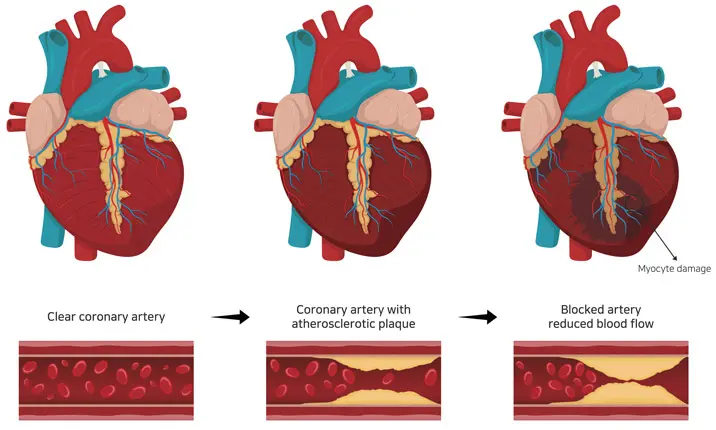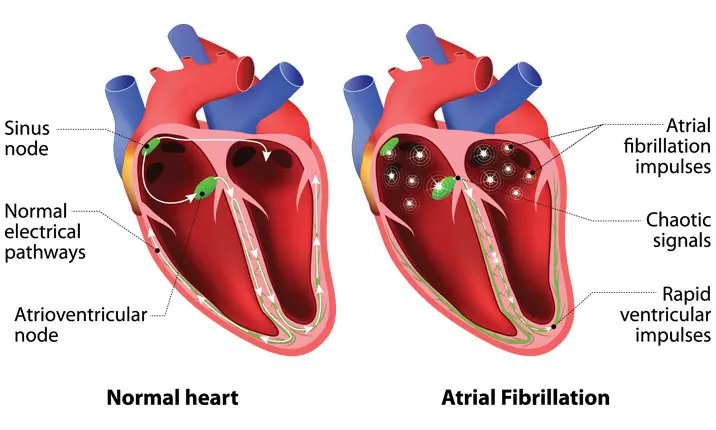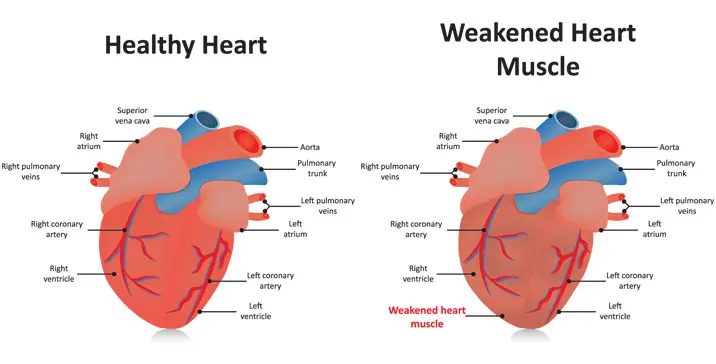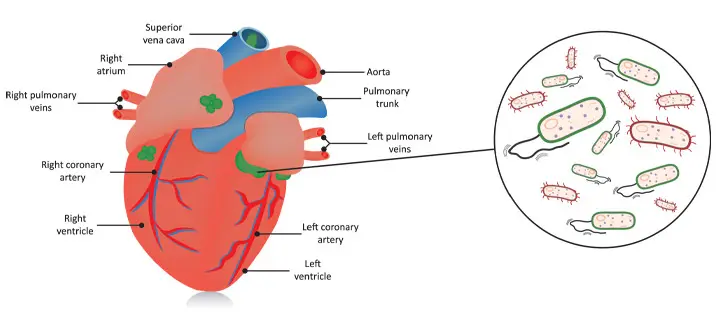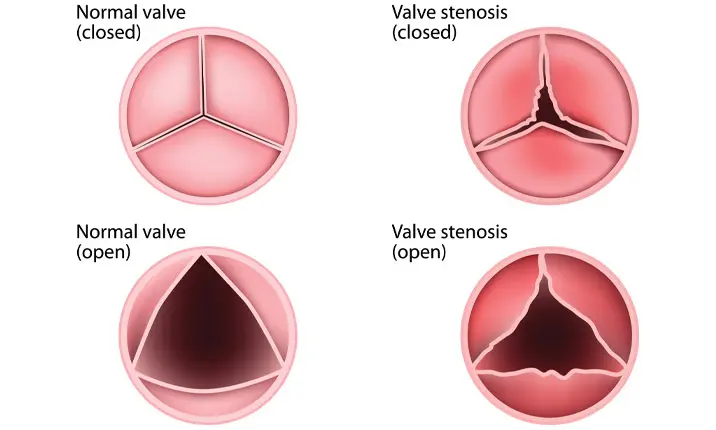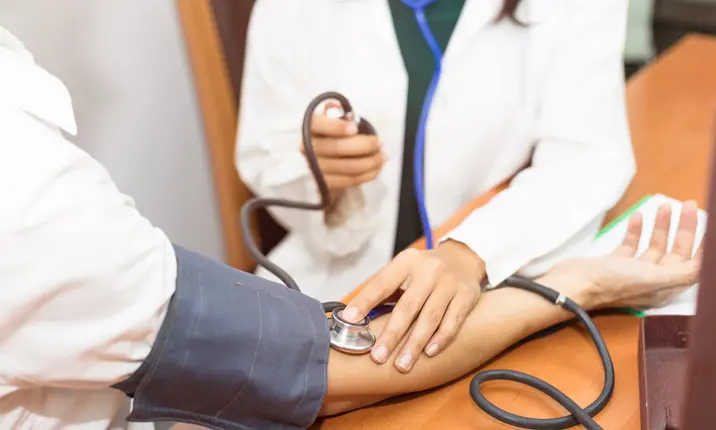What is heart disease?
Generally speaking, heart disease covers any disorder of the heart and circulatory system. It's a serious issue that is the leading cause of death of men in America, with 1 in 4 men dying from it. Closer to home, almost 1 in 3 deaths in Singapore are attributed to heart diseases or stroke.
The most common types of heart disease include blood vessel diseases such as coronary artery disease, heart rhythm sickness (arrhythmias), and born-with (congenital) heart defects. Other conditions usually involve narrowed or blocked blood vessels that can lead to chest pain, heart attacks, or even a stroke.
Coronary artery disease
Coronary artery disease is the narrowing or blockage of the coronary arteries. This is usually caused by the build-up of cholesterol and fatty deposits inside the arteries. Common symptoms of coronary artery disease include chest pain, shortness of breath, heart palpitations, a faster-than-normal heartbeat, dizziness, nausea, extreme weakness, and sweating.
Heart rhythm sickness (arrhythmias)
Heart arrhythmias occur when electrical impulses that coordinate heartbeats don't work properly. This causes the heart to beat too fast, too slow or irregularly. Arrhythmias may not cause any signs or symptoms. When noticeable, symptoms may include a fluttering in your chest, a racing or slow heartbeat, chest pain, shortness of breath, anxiety, fatigue and sweating.
Congenital heart defects
Congenital heart defects are the most common type of birth defect. These include abnormalities to the structure of a baby's heart and the way it works. Congenital heart defects can vary from mild to severe. Signs and symptoms depend on the type and severity of the defect. Some conditions may cause a baby to have the symptoms such as blue-tinted nails or lips, fast or troubled breathing, tiredness when feeding, and sleepiness.
Heart attack
Also called a myocardial infarction, a heart attack occurs when the flow of blood to the heart is blocked. This is often due to a buildup of fat, cholesterol and other substances in the arteries. Common heart attack symptoms include tightness or an aching sensation in the chest or arms, heartburn or abdominal pain, shortness of breath, cold sweat, fatigue, and light-headedness.
Different heart diseases trigger a variation of symptoms – and recognising the correct match can help medical professionals identify the cause quickly in an emergency so that the right action is taken.
What are some common heart diseases and their symptoms?
Heart disease in the blood vessels
While the list is pretty large, we've listed some of the broader categories of heart disease and their causes.
Heart disease in the blood vessels
The coronary arteries supply the heart with nutrients and oxygen by circulating blood. Cardiovascular diseases occur when these arteries can get clogged up with plaque from cholesterol and fatty deposits. You may want to be mindful of this if you're a meat lover or consume a lot of animal-based products like eggs and milk.
If a blood clot occurs, blood flow is restricted, potentially causing a heart attack.
Symptoms of coronary artery disease include:
- Chest pain, tightness, pressure and discomfort
- Cold shivers
- Shortness of breath
- Pain, numbness and weakness in the neck, jaw, throat and upper abdomen
Abnormal heartbeat
When your heart beats fast or irregularly it could be due to a heart arrhythmia. Common causes include natural heart defects, diabetes, high blood pressure, or extreme smoking and alcoholic habits. Stress could also play a part in causing heart arrhythmia – so workaholics out there, do make time for rest.
Symptoms of abnormal heartbeat include:
- An abnormally quick, slow or erratic heartbeat
- A 'fluttering' feeling in your chest
- Chest pain
- Shortness of breath
- Light-headedness, dizziness or fainting.
Weak heart muscle
Weak heart muscle or cardiomyopathy is disease of the heart muscle that makes it harder for the heart to pump blood to the rest of the body. There are several types of cardiomyopathy, affecting different parts of the heart and resulting in different levels of symptom severity.
Symptoms usually appear as the condition advances and include:
- Breathlessness with exertion or even at rest
- Swelling of the legs, ankles and feet
- Bloating of the abdomen due to fluid build-up
- Cough when lying down
- Fatigue
- Heartbeats that are rapid, pounding or fluttering
- Chest discomfort or pressure
- Dizziness, light-headedness and fainting
Heart infections
Heart infections occur when the inner membrane that separates the heart's chambers and valves is infected. They are usually caused by the presence of bacteria, parasites or viruses in the heart.
Symptoms of a heart infection include:
On top of symptoms similar to the previous conditions, one could experience fever, dry cough, or even unusual skin rashes.
Valvular heart disease
Some may be born with valvular heart disease, and others may get them from connective tissue disorders. When any of the 4 valves of the human heart are damaged and does not allow blood to flow through as it should – leading to narrowing, leaking, or improper closing of the valves, one can be in physical danger.
Symptoms of valvular heart disease include:
The symptoms that occur differ, but they include fatigue, shortness of breath, irregular heartbeats, swollen feet, and fainting spells.
When to seek medical attention?
Seek immediate medical care once chest pain, shortness of breath, or fainting is experienced – because these symptoms can point to an impending heart attack or stroke.
Always remember that prevention is better than cure. Even if you don’t display any of these symptoms, be sure to speak to a cardiologist about unusual symptoms and ways to proactively reduce your risk of heart disease.
How to keep my heart healthy?
While you can't change risk factors – such family history, gender or ageing – heart disease is certainly avoidable.
Here are 7 tips to keep your heart healthy
Book an annual heart screening check-up
Adults, especially those aged 45 and older, and those with a history of heart disease, should get checked once a year.
Get enough rest
Having enough sleep is also crucial for lowering high blood pressure, obesity and diabetes – night owls and workaholics take note!
Keep that cholesterol level in check
Manage your cholesterol levels by making conscious lifestyle changes, such as switching for healthier food options. This includes getting enough physical activity and eating your greens.
Take medication to lower the risk of heart attack and stroke
Your doctor may prescribe medicines that reduce the risk of heart attack and stroke by helping to lower cholesterol levels in the blood. This can be helpful for some people with high cholesterol, diabetes, and high blood pressure.
Get your blood pressure checked
High blood pressure is known as a silent killer as it has no signs or symptoms. Get your blood pressure checked regularly to make sure that it is within the acceptable range for you.
Eat healthy
Eat a heart-healthy diet, which includes foods that are low in saturated and trans fats, added sugars and salt. Eat more of high-fibre foods and healthy fats such as those in olive oil and fish.
Get active and exercise
Adults need at least 150 minutes of moderate aerobic activity each week. This includes brisk walking, dancing and biking. Regular physical activity also helps reduce and maintain your weight at a healthy level.


